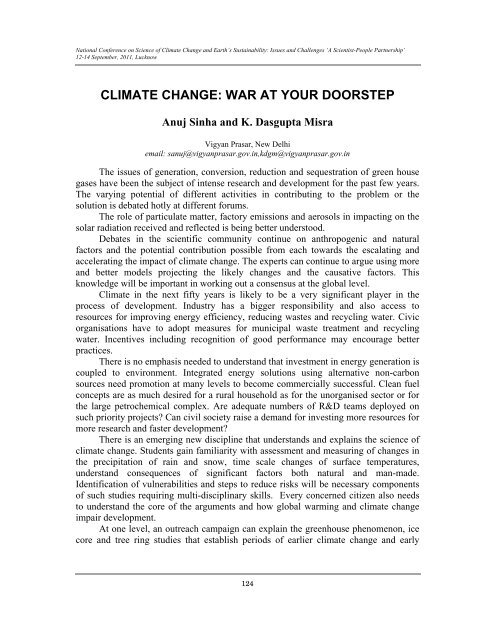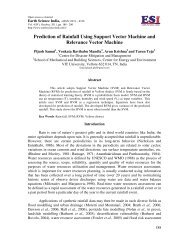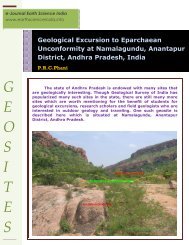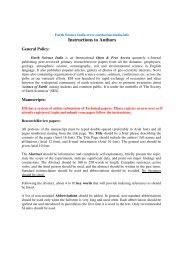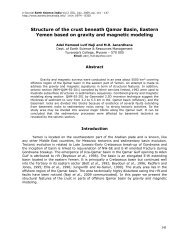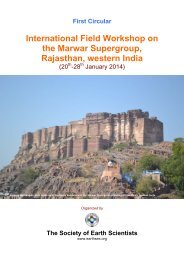12-14 September, 2011, Lucknow - Earth Science India
12-14 September, 2011, Lucknow - Earth Science India
12-14 September, 2011, Lucknow - Earth Science India
You also want an ePaper? Increase the reach of your titles
YUMPU automatically turns print PDFs into web optimized ePapers that Google loves.
National Conference on <strong>Science</strong> of Climate Change and <strong>Earth</strong>’s Sustainability: Issues and Challenges ‘A Scientist-People Partnership’<br />
<strong>12</strong>-<strong>14</strong> <strong>September</strong>, <strong>2011</strong>, <strong>Lucknow</strong><br />
CLIMATE CHANGE: WAR AT YOUR DOORSTEP<br />
Anuj Sinha and K. Dasgupta Misra<br />
Vigyan Prasar, New Delhi<br />
email: sanuj@vigyanprasar.gov.in,kdgm@vigyanprasar.gov.in<br />
The issues of generation, conversion, reduction and sequestration of green house<br />
gases have been the subject of intense research and development for the past few years.<br />
The varying potential of different activities in contributing to the problem or the<br />
solution is debated hotly at different forums.<br />
The role of particulate matter, factory emissions and aerosols in impacting on the<br />
solar radiation received and reflected is being better understood.<br />
Debates in the scientific community continue on anthropogenic and natural<br />
factors and the potential contribution possible from each towards the escalating and<br />
accelerating the impact of climate change. The experts can continue to argue using more<br />
and better models projecting the likely changes and the causative factors. This<br />
knowledge will be important in working out a consensus at the global level.<br />
Climate in the next fifty years is likely to be a very significant player in the<br />
process of development. Industry has a bigger responsibility and also access to<br />
resources for improving energy efficiency, reducing wastes and recycling water. Civic<br />
organisations have to adopt measures for municipal waste treatment and recycling<br />
water. Incentives including recognition of good performance may encourage better<br />
practices.<br />
There is no emphasis needed to understand that investment in energy generation is<br />
coupled to environment. Integrated energy solutions using alternative non-carbon<br />
sources need promotion at many levels to become commercially successful. Clean fuel<br />
concepts are as much desired for a rural household as for the unorganised sector or for<br />
the large petrochemical complex. Are adequate numbers of R&D teams deployed on<br />
such priority projects? Can civil society raise a demand for investing more resources for<br />
more research and faster development?<br />
There is an emerging new discipline that understands and explains the science of<br />
climate change. Students gain familiarity with assessment and measuring of changes in<br />
the precipitation of rain and snow, time scale changes of surface temperatures,<br />
understand consequences of significant factors both natural and man-made.<br />
Identification of vulnerabilities and steps to reduce risks will be necessary components<br />
of such studies requiring multi-disciplinary skills. Every concerned citizen also needs<br />
to understand the core of the arguments and how global warming and climate change<br />
impair development.<br />
At one level, an outreach campaign can explain the greenhouse phenomenon, ice<br />
core and tree ring studies that establish periods of earlier climate change and early<br />
<strong>12</strong>4


